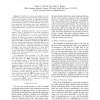Free Online Productivity Tools
i2Speak
i2Symbol
i2OCR
iTex2Img
iWeb2Print
iWeb2Shot
i2Type
iPdf2Split
iPdf2Merge
i2Bopomofo
i2Arabic
i2Style
i2Image
i2PDF
iLatex2Rtf
Sci2ools
105
click to vote
FAST
2007
2007
AMP: Adaptive Multi-stream Prefetching in a Shared Cache
Abstract— Prefetching is a widely used technique in modern data storage systems. We study the most widely used class of prefetching algorithms known as sequential prefetching. There are two problems that plague the state-of-the-art sequential prefetching algorithms: (i) cache pollution, which occurs when prefetched data replaces more useful prefetched or demand-paged data, and (ii) prefetch wastage, which happens when prefetched data is evicted from the cache before it can be used. A sequential prefetching algorithm can have a fixed or adaptive degree of prefetch and can be either synchronous (when it can prefetch only on a miss), or asynchronous (when it can also prefetch on a hit). To capture these distinctions we define four classes of prefetching algorithms: Fixed Synchronous (FS), Fixed Asynchronous (FA), Adaptive Synchronous (AS), and Adaptive Asynchronous (AA). We find that the relatively unexplored class of AA algorithms is in fact the most promising for sequential prefetc...
Related Content
| Added | 29 Oct 2010 |
| Updated | 29 Oct 2010 |
| Type | Conference |
| Year | 2007 |
| Where | FAST |
| Authors | Binny S. Gill, Luis Angel D. Bathen |
Comments (0)

